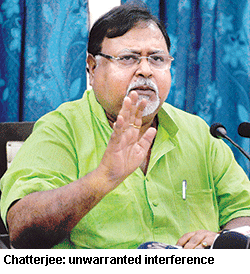 Now in its second consecutive term in office at Writers Building, Kolkata, the Trinamool Congress (TMC) government of West Bengal (pop.91 million) led by chief minister Mamata Banerjee is shifting its attention to the education sector which experienced severe neglect and politicisation during the 34 years of uninterrupted rule (1977-2004) of the Communist Party of India-Marxist (CPM)-led Left Front. But incidents of campus violence and political control of education institutions continue to damage the state’s once-vaunted education institutions, specially higher ed institutions.
Now in its second consecutive term in office at Writers Building, Kolkata, the Trinamool Congress (TMC) government of West Bengal (pop.91 million) led by chief minister Mamata Banerjee is shifting its attention to the education sector which experienced severe neglect and politicisation during the 34 years of uninterrupted rule (1977-2004) of the Communist Party of India-Marxist (CPM)-led Left Front. But incidents of campus violence and political control of education institutions continue to damage the state’s once-vaunted education institutions, specially higher ed institutions.
Recently, the government’s unsolicited advice to Jadavpur University (JU, estb.1955) to scrap admission tests for three undergraduate courses has not gone down well with academics, teachers, students and specially the JU authorities. On November 22, a day after education minister Partha Chatterjee proposed a uniform admission procedure by doing away with admission tests, nearly all stakeholders vehemently opposed this initiative on the ground that it was tantamount to interference in the academic autonomy of the university.
On November 21, Chatterjee announced to the state’s legislative assembly that Jadavpur University should admit students on the basis of marks obtained in the school-leaving class XII board exams instead of conducting admission tests for some subjects and following a separate entry policy for others. JU conducts admission tests for aspiring undergraduates in English, comparative literature and international relations study programmes. Students are admitted on the basis of their performance in these entrance tests.
“The state government gives grants to universities, so the government can interfere in the affairs of the university,” Chatterjee has been repeatedly saying, thus striking at the root of the principle of university autonomy.
According to academics, there’s a strong correlation between students’ performance at the undergraduate level and their scores in the JU admission test, though there’s no such correlation between the board exam and either of the two. Persisting with the current practice is necessary to maintain high standards for which the university is known, says a JU spokesperson.
Though reputed for its technology programmes, JU has overtaken most higher ed institutions in Bengal in the humanities and social sciences as well. Notable alumni of JU include Arundhati Bhattacharya, the first woman chairperson of State Bank of India; K.S. Dasgupta, director of the Indian Institute of Space Science and Technology, Subir Raha, former director of Oil and Natural Gas Corporation and 11 Shanti Swarup Bhatnagar laureates.
The JU admission process for undergrad programmes begins in the months of July and August every year. For B.Sc courses, there is no admission test with scores of the school-leaving class XII board exam deemed sufficient. However, for arts and the humanities the university has its own entrance examinations for separate subject specialisations, while admission into JU’s engineering and technology programmes is based on scores in the West Bengal Joint Entrance Examination (WBJEE) followed by counselling.
Faculty at JU contend that if the current schema is scrapped, the university won’t be able to admit high-calibre students into critical undergrad programmes. They argue that the syllabuses of the country’s 31 school exam boards vary widely and there is no common yardstick to judge a student. Therefore, entrance tests create level-playing fields for all students and enable the university to evaluate admission aspirants. They cite the example of the IITs which resisted a similar proposal ill-advisedly mooted by then Union HRD minister Kapil Sibal in 2012 that was defeated by dividing IIT-JEE (joint entrance examination) into the main and advanced examination with the latter conducted by the joint council of the IITs.
Comments Sukanta Bhattacharya, associate professor of economics at the University of Calcutta: “Universities must enjoy the right to admit students according to their own criteria. The government should not interfere as long as the admission process is fair and based on merit. Universities are known to have their own set of rules. There’s nothing wrong if they follow a blend of practices that include their own admission tests.”
Regrettably, the TMC government which had swept to power in 2011 and again in 2016 with the promise of poribortan (change) seems inclined to follow the CPM-led Left Front government’s example of unwarranted interference in academia. It would be well-advised to cease and desist in the interests of the unfortunate youth of the state who are grappling with the problem of rising unemployment. That would be a welcome poribortan.
Baishali Mukherjee (Kolkata)